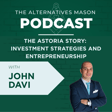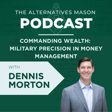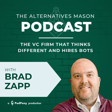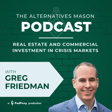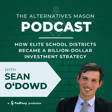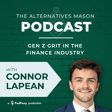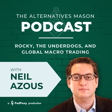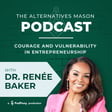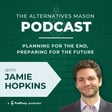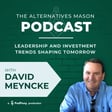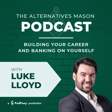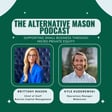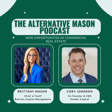
The Alternatives Mason: Building Alts Knowledge Brick by Brick | Episode 1 | Guest Aaron Filbeck
Welcome to The Alternatives Mason: Building Alts Knowledge Brick by Brick. Banrion Capital Management uses technology to help independent advisors scale and educate themselves on alternative investments. Since education is such a big piece of the Banrion mission and business, we are excited to kick off this series to dive into the nits and grits of the alternatives space. Our first guest is Aaron Filbeck, Managing Director and Head of UniFi by CAIA.
As Managing Director and Head of UniFi by CAIA™ , Aaron oversees content and product strategy for the UniFi by CAIA™ Program. Prior to this, Aaron was responsible for the strategic direction of CAIA Association's content agenda, thought leadership, and member education initiatives, and supported content development for the CAIA Charter Program. His work has been published by Oxford University Press and The Journal of Investing, and covers topics such as ESG/sustainable investing, liquid alternatives, commodities, and asset pricing/factor investing. He is a frequent writer and speaker on these topics. Aaron’s practitioner experience lies in private wealth management, where he served as portfolio manager, overseeing asset allocation, portfolio construction, and manager research efforts for high-net-worth individuals and institutional retirement plans.
He earned a B.S. with distinction in Finance and a Master of Finance from Penn State University. He holds the Chartered Alternative Investment Analyst (CAIA), Chartered Financial Analyst (CFA), Certificate in Investment Performance Measurement (CIPM), Financial Data Professional (FDP) designations, is a CERTIFIED FINANCIAL PLANNER™, and holds the the CFA Institute's Certificate in ESG Investing. He is a Past President of CFA Society Columbus and serves on the CFA Society Philadelphia Programs Committee. Aaron is an adjunct professor and serves on multiple advisory boards for Penn State University.
Host Brittany Mason’s diverse background has given her a unique perspective stepping in to the role as Chief of Staff at Banríon Capital. Throughout her career she has embraced challenging projects proving her ability to lead the development and the successful launch of brands. From staffing, branding, and marketing, Brittany has spent the last 20 years working in the fashion and entertainment industry with some of the world’s most iconic brands. This includes but not limited to event management and production for high scale events like the Superbowl, Indianapolis 500, TAO Group, NYFW, Miami Fashion Week, product launches at Salesforce’s Dreamforce, CES, and partnerships with brands such as John Frieda, Eleven Australia, and Valentino.
Her extensive work in the industry motivated Brittany to produce her own events. In 2013 her first directorial project was to spread awareness for Prostate Cancer. This 1 minute campaign video reached 13 million in just a few short weeks. This is when Brittany began producing charity fashion shows and coaching young entrepreneurs under her brand MOXIE Media. In Just one year Brittany worked with approximately 100 thousand students. In 2017 Brittany launched MOXIE Media Productions in Ireland, becoming the Director and license holder of Miss Universe Ireland. Brittany is known for the rebrand and launch of the Universe brand in Ireland and over the course of 5 years built a historical track record for the country that earned several global awards. Miss Universe Ireland became one of the country’s most exclusive and sought out events to attend. In 2019 MOXIE Media gained the right to Miss Indiana USA and Miss Indiana Teen USA making it the first production company in history to participate in the 3 largest competitions year after year; Miss Teen USA, Miss USA, and Miss Universe. Through her work she has shown her commitment to creating career opportunities and empowering others, especially women to become leaders within their own communities.
